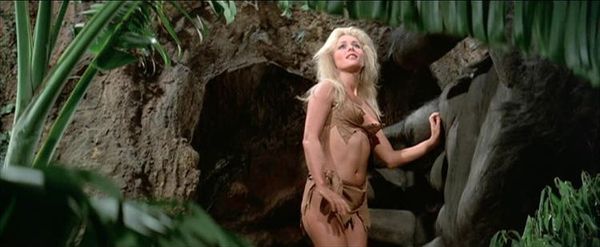
From a remote Indian jungle a rumor has spread of a giant gorilla. Word reaches Hong Kong and an unscrupulous businessman, Lu Tien (Ku Feng), enlists a heartbroken explorer, Feng (Danny Lee), to lead an expedition in search of the legendary ape. Thus The Mighty Peking Man (1977) begins.
The Shaw Brothers’ The Mighty Peking Man is an unveiled cash-in on King Kong (1976) with just a few simple narrative changes. Perhaps the most daring innovation of The Mighty Peking Man is replacing the Fay Wray/Jessica Lange damsel in distress/conflicted environmentalist with a Sheena type of character named Ah Wei (Evelyne Kraft). Ah Wei’s arc is essentially lifted from Tarzan but it allows the filmmakers to dispense with a lot of the jingoism of the King Kong films while also introducing a fresh dramatic element. Ah Wei was raised by Ah Wang, the titular Peking Man, since her infancy and knows nothing but the jungle, with its friendly jaguars and elephants, until she rescues Feng.
The arc of Feng and Ah Wei’s romance isn’t what one would expect either. Once Lu Tien has transported Ah Wang to Hong Kong, Feng rekindles his relationship with a girlfriend who cheated on him a year ago, spurning Ah Wei. This oddly realistic development flies in the face of the kind of romanticism associated with King Kong. Ah Wei doesn’t just feel betrayed by Ah Wang’s exploitative captors the way Lange feels for Kong, her betrayal is as singular as Wang’s. From the moment Ah Wei met Feng in the jungle, her destiny and the fate of Ah Wang were joined in doom.
Despite all of these interesting changes to the formula, director Ho Meng Hua isn’t able to escape the technological limitations posed by the spectacle of a gigantic ape. The Mighty Peking Man is packed to the gills with miniatures in both single and composite shots all designed to give the illusion that a giant gorilla really is decimating Hong Kong. These effects aren’t so bad themselves, they just become even more ludicrous when coupled with the design of Ah Wang.
Ah Wang, just like the Kong of 1976, is a guy in a monkey suit. Ah Wang’s mask isn’t nearly as life-like or complex as Rick Baker’s designs for King Kong. In some of Ah Wang’s close-ups one can even see the stuntman’s forehead beneath the mask while in other shots Ho Meng Hua cuts to a terrifying looking stand-in puppet of Ah Wang’s head. In shots where Ah Wang carries Ah Wei, either in his hand of on his shoulder, it’s obvious that a little doll has been fastened to the ape costume.
While Ho Meng Hua’s treatment of the Ah Wei character may be affecting to some viewers, the overall experience of The Mighty Peking Man is fifty percent camp and fifty percent pulp. This Shaw Brothers production is an ambitious piece of trash cinema that actually works. Back in the nineties Quentin Tarantino seemed to always be plugging The Mighty Peking Man as an overlooked classic. As tiresome as Tarantino is, in this instance he was right.
